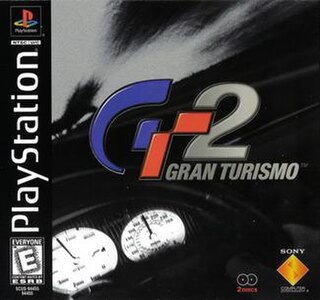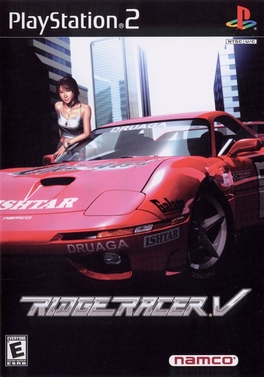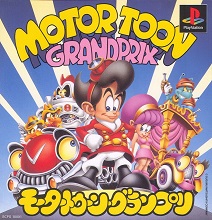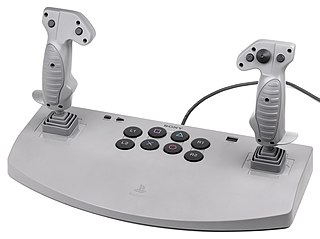Racing games are a video game genre in which the player participates in a racing competition. They may be based on anything from real-world racing leagues to fantastical settings. They are distributed along a spectrum between more realistic racing simulations and more fantastical arcade-style racing games. Kart racing games emerged in the 1990s as a popular sub-genre of the latter. Racing games may also fall under the category of sports video games.

Gran Turismo (GT) is a series of racing simulation video games developed by Polyphony Digital. Released on PlayStation systems, Gran Turismo games are intended to emulate the appearance and performance of a large selection of vehicles, most of which are licensed reproductions of real-world automobiles. Since the franchise's debut in 1997, over 90 million units have been sold worldwide, making it the best selling video game franchise under the PlayStation brand. An adapted film based on the series and Jann Mardenborough's career was released in August 2023 and directed by Neill Blomkamp.

Simulated racing or racing simulation, commonly known as simply sim racing, are the collective terms for racing game software that attempts to accurately simulate auto racing, complete with real-world variables such as fuel usage, damage, tire wear and grip, and suspension settings. To be competitive in sim racing, a driver must understand all aspects of car handling that make real-world racing so difficult, such as threshold braking, how to maintain control of a car as the tires lose traction, and how properly to enter and exit a turn without sacrificing speed. It is this level of difficulty that distinguishes sim racing from arcade racing-style driving games where real-world variables are taken out of the equation and the principal objective is to create a sense of speed as opposed to a sense of realism.

Gran Turismo 4 is a 2004 racing simulation video game developed by Polyphony Digital and published by Sony Computer Entertainment for the PlayStation 2. It is the fourth main installment and the sixth overall in the Gran Turismo series. It was released on December 28, 2004, in Japan and Hong Kong, February 22, 2005, in North America, and March 9, 2005, in Europe, and has since been re-issued under Sony's Greatest Hits brand.

Gran Turismo 3: A-Spec is a 2001 racing simulation video game developed by Polyphony Digital and published by Sony Computer Entertainment for the PlayStation 2. It is the third installment in the Gran Turismo series. During its demonstration at E3 2000 and E3 2001, the game was known under the working title Gran Turismo 2000.

Gran Turismo 2 is a 1999 racing simulation video game developed by Polyphony Digital and published by Sony Computer Entertainment for the PlayStation. It is the sequel to Gran Turismo, the second installment of the Gran Turismo series, and the first installment in the series without involvement from Japan Studio.

Ridge Racer Revolution is a racing video game developed and published by Namco for the PlayStation in 1995. It is the sequel to the PlayStation version of Ridge Racer. Like the original Ridge Racer, the player races computer-controlled cars with the objective of winning a series of races, and supports Namco's NeGcon controller. Ridge Racer Revolution adds two hidden cars, and two-player support via the PlayStation Link cable, and took roughly the same time to develop as the first. The intention was to increase the depth and add features.

Kazunori Yamauchi, nicknamed "Kaz", is a Japanese game designer and professional racing driver. He is the CEO of Polyphony Digital and producer of the Gran Turismo video game series.

The NeGcon, stylized as neGcon, is a motion-based game controller manufactured in 1995 by Namco for the PlayStation. One of the first third-party peripherals for the system, the controller is connected by a swivel joint, allowing the player to twist the halves relative to each other. The controller also replaces the "symbol" buttons on the original PlayStation controller with two "A" and "B" buttons, as well as "I" and "II" buttons that allowed for analogue control. A black variant was released exclusively in Japan.

Ridge Racer V is a 2000 racing game developed and published by Namco for the PlayStation 2, as a launch game for that platform. It is the fifth title of the Ridge Racer series succeeding Ridge Racer Type 4 and was followed by Ridge Racer 6 in 2005. The game received a home-to-arcade port named Ridge Racer V: Arcade Battle.

The Dual Analog Controller is Sony's first handheld analog controller for the PlayStation, and the predecessor to the DualShock; the first analog controller was the PlayStation Analog Joystick (SCPH-1110).

Motor Toon Grand Prix is a racing video game developed by Japan Studio's Polys Entertainment and published by Sony Computer Entertainment for the PlayStation. It was released exclusively in Japan on December 16, 1994. The game and its sequel were directed by Kazunori Yamauchi, and are precursors to his subsequent racing series Gran Turismo.

The PlayStationAnalog Joystick (SCPH-1110) is Sony's first analog controller for the PlayStation, and is the precursor to the PlayStation Dual Analog Controller. It is often incorrectly referred to as the "Sony Flightstick".

Gran Turismo is a 1997 racing simulation video game developed by Japan Studio's Polys Entertainment and published by Sony Computer Entertainment for the PlayStation. It was directed by Kazunori Yamauchi and produced by Shuhei Yoshida. It is the first game in the Gran Turismo series.

Gran Turismo 5 is a 2010 racing simulation video game developed by Polyphony Digital and published by Sony Computer Entertainment for the PlayStation 3. It is the fifth main installment and the tenth overall in the Gran Turismo series. It was released on November 24, 2010, in Europe and North America, and November 25, 2010, in Japan and Australasia. It was preceded by the Prologue version and is the first main entry of the series to be released for the PlayStation 3.

Gran Turismo 5 Prologue is a 2007 racing simulation video game developed by Polyphony Digital and published by Sony Computer Entertainment for the PlayStation 3. It is the eighth overall installment in the Gran Turismo series. Gran Turismo 5 Prologue is a precursor to Gran Turismo 5, in celebration of the series' tenth anniversary.

Gran Turismo 6 is a 2013 racing simulation video game developed by Polyphony Digital and published by Sony Computer Entertainment for the PlayStation 3. It is the sixth main installment and the eleventh overall in the Gran Turismo series. It was released worldwide on December 6, 2013. It was met with positive reception and was a financial success. New features included the addition of more cars and tracks, improvements to the car customisation options, and partnerships with the Goodwood Festival of Speed, the Ayrton Senna Institute, the FIA and NASCAR. Gran Turismo 6 is the first game to feature officially FIA-certified content.

GT Academy was a television programme produced by Grand Central Entertainment and funded by Nissan and Sony Interactive Entertainment from 2008 to 2016. GT Academy provided skilled Gran Turismo players an opportunity to earn a real-life professional racing career with Nissan.

Gran Turismo is a 2023 American biographical sports drama film directed by Neill Blomkamp from a screenplay by Jason Hall and Zach Baylin. Produced by Columbia Pictures, PlayStation Productions, and 2.0 Entertainment, it is based on the racing simulation video game series of the same name developed by Polyphony Digital. It tells the true story of British teenager Jann Mardenborough, a teenage Gran Turismo player who became a professional racing car driver. The film stars Archie Madekwe as Mardenborough alongside David Harbour, Orlando Bloom, Darren Barnet, Geri Halliwell Horner, and Djimon Hounsou.


















